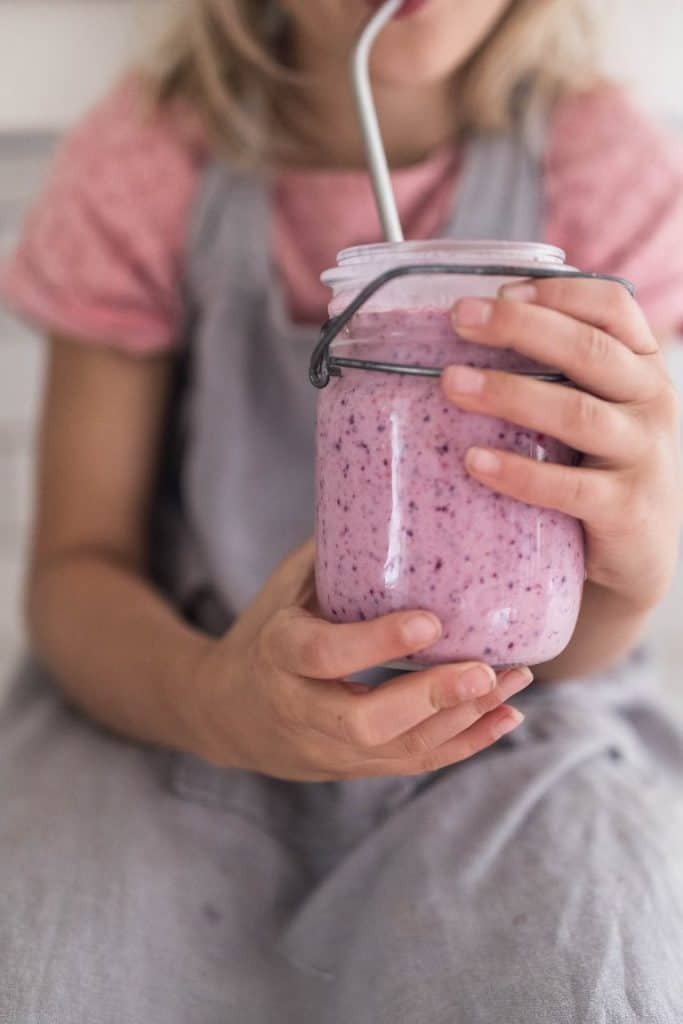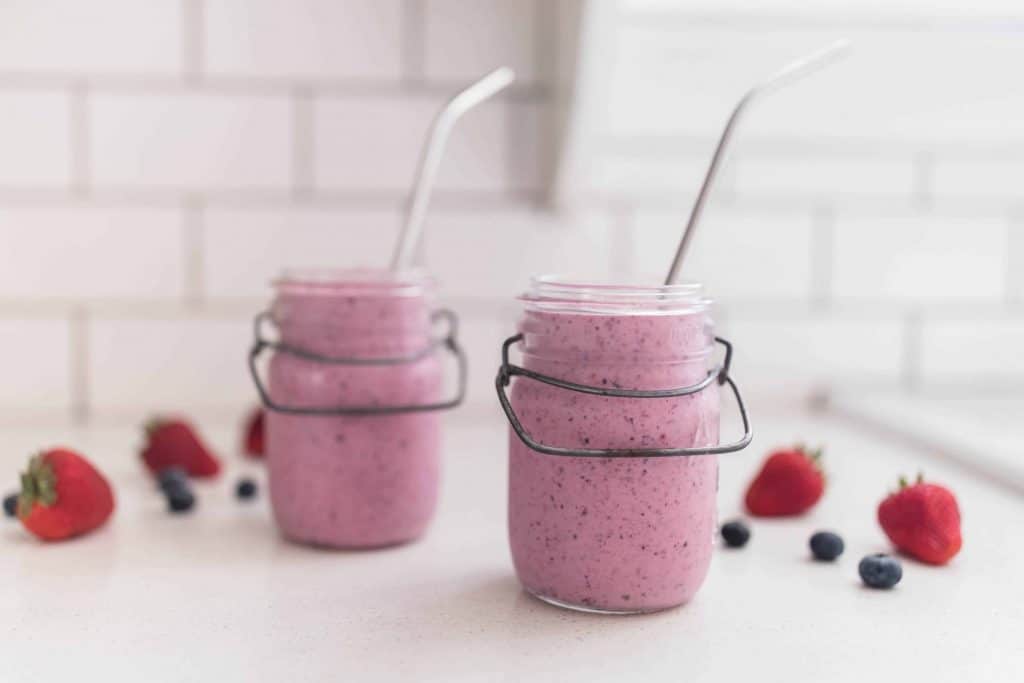Kefir smoothies are a fantastic way to pack in essential nutrients for the day. With a good blender and my FREE e-book of tasty recipes, you can whip up a delicious, nutrient-dense meal.
Kefir smoothies are full of nutrition
Kefir is a great source of probiotics – the friendly bacteria your gut needs to thrive. In high-quality kefir, you can find lactobacillus acidophilus, lactobacillus brevis, and lactobacillus casei among other strains.
Kefir is also a good source of vitamins and minerals. According to Healthline, Kefir contains the following nutrients:
- Protein
- Calcium
- Phosphorus
- Vitamin B12
- Riboflavin (B2)
- Magnesium
- Vitamin D
Kefir also contains vitamin K2 – an essential nutrient that regulates calcium deposition in the bones and prevents blood vessels and kidneys from calcifying.
While some of kefir’s nutrients are naturally occurring, others are added later. For example, the presence of vitamin D in both milk and kefir is from fortification. The specific nutritional content of kefir will vary by brand.

How is kefir made?
Kefir is made by fermenting a mixture of ‘friendly bacteria’, yeast, and milk for a minimum of 24 hours. While the mixture sits, the bacteria and yeast digest the lactose into lactic acid, which triggers the friendly bacteria to multiply. The result is a substance thinner than yogurt, naturally carbonated with a tart flavor.
Although traditionally found in Europe and Asia, kefir has become a popular gut health supplement in the United States and other countries. The global kefir market is expected to reach $2154.9 million by 2025. This rapidly growing market is driven primarily by the health benefits associated with kefir.
After making kefir part of their daily routine, millions of people worldwide have reported improved digestion, increased immunity, and improved allergy symptoms.
Kefir smoothies can support bone health
Living a healthy life requires having strong, healthy bones. Kefir may play a role in preventing osteoporosis and guarding against fractures.
At least one study links kefir to bone health. This makes sense considering kefir is rich in vitamin K2, which increases calcium absorption in bone cells. Increased calcium absorption increases bone density, which decreases the potential for fractures.
Kefir smoothies can help improve digestion
Kefir lovers around the world have reported improved digestion and reduced overall inflammation. This makes sense considering kefir is naturally rich in probiotics.
Probiotics are living organisms (bacteria) that occur naturally in fermented foods like sauerkraut, miso, yogurt, kimchi, and kefir. The bacteria in kefir are considered ‘friendly’ because they prevent harmful bacteria from settling in the gut.
While kefir can have 30 or more beneficial strains of bacteria, the exact combination varies by culture.
Kefir smoothies are more powerful than probiotic yogurts
Do you put yogurt in your smoothies to add thickness and a creamy flavor? If so, you’ll have an easy time switching to kefir.
While both yogurt and kefir contain beneficial bacteria, kefir is the superior source. Both are made with starting cultures that are fermented, but each culture is unique.
The biggest difference is that beneficial bacteria found in yogurt are transient. In other words, the bacteria pass through the digestive tract completely. On the other hand, the beneficial bacteria in kefir can proliferate and colonize the intestinal tract. Maintaining gut health requires the proliferation of beneficial bacteria to prevent the harmful bacteria from multiplying and taking over. The transient bacteria in yogurt won’t stick around long enough to multiply.
What about the probiotic yogurt at the grocery store? The main problem with probiotic yogurt is a lack of probiotics. Plenty of yogurts are advertised as probiotic, but they lack enough friendly bacteria to deliver results.
Nutritional science researchers at the University of Toronto conducted a study in 2017 that found probiotic levels in popular yogurts were often 25 times lower than what clinical trials found effective.
While it’s possible that some yogurt brands might contain enough probiotics to match the results of clinical trials, if you’re not a scientist with a lab, it’s a guessing game. There’s no way to know how much and what strains of friendly bacteria are in the yogurt you’re eating.
To maintain a healthy gut, you need specific strains that will colonize your intestinal tract. Instead of taking a chance with yogurt, head to your local health food store and get some high-quality kefir.
Find kefir without added sugar
There is a strong link between gut health and sugar. More specifically, excessive consumption of refined sugar has been linked to a deficit of beneficial bacteria in the gut. This can lead to inflammation, candida, and other ailments.
Getting the most out of your kefir smoothies requires avoiding sugar as much as possible. Although you might be tempted to get flavored kefir, most flavored kefir will contain sugar. You might be able to find kefir sweetened with stevia, which is a healthy alternative to artificial sweeteners. Stevia is a sweet-tasting leaf that you can grow right in your garden.
Why should you avoid sugar? Consuming sugar works strongly against your gut health. Harmful gut bacteria feeds on sugar and flourishes while decreasing the beneficial bacteria in your intestines. An abundance of bad bacteria in the gut can increase inflammation in the body, which can lead to a host of health problems.
Since many people prefer kefir’s naturally tart flavor, it’s easy to find kefir that isn’t loaded with extra sugar. When you find sugar-free kefir, read the list of ingredients to make sure there are no artificial sweeteners.
If you don’t like the tart flavor of kefir, don’t worry. Naturally sweet fruits like blueberries, bananas, or strawberries can be added to mask the tartness.
Kefir smoothies replenish friendly bacteria stripped by antibiotics
Antibiotics are a powerful defense against bacterial infections, but they don’t discriminate between harmful and helpful gut bacteria. Antibiotics alter gut microbiota, which can cause diarrhea. If you’re taking antibiotics, adding probiotics to your regimen can reduce the risk of diarrhea.
Reviews of 105 studies involving more than 11,000 participants found that taking probiotics with antibiotics reduced the risk of diarrhea by 50% in adults and children.
The bottom line is that taking probiotics to replenish beneficial gut bacteria is essential when you’re on antibiotics. However, antibiotics don’t discriminate between helpful and harmful bacteria, so probiotics should be taken a few hours after antibiotics.
Since the beneficial bacteria in kefir can colonize the intestines, a kefir smoothie is the best way to rebound from a course of antibiotics.
Kefir smoothies can improve lactose intolerance
Many people have a hard time digesting lactose.
While kefir is fermenting, the lactic acid bacteria pre-digest the lactose and turn it into lactic acid. This reduces the amount of lactose present in kefir, making it easy for people who are lactose intolerant to digest. Lactic acid also contains enzymes that help break down leftover lactose.
While many lactose intolerant people find kefir easy to digest, consuming kefir on a regular basis has been shown to improve long-term ability to digest lactose. In 2003, a small study found that consuming plain, unflavored kefir improved lactose digestion over time. The flavored kefir used in the study didn’t produce the same results, likely because of the sugar.
Lactose intolerant? Try non-dairy kefir smoothies
For those who still don’t want to risk consuming a dairy product, there are plenty of dairy-free kefir options out there. Kefir can be made from just about any non-dairy beverage including coconut water, fruit juice, almond milk, or coconut milk.
Kefir smoothies might help with allergies
Allergies are caused by inflammatory responses to the environment, food, and other substances. In animal studies, kefir has been shown to suppress these inflammatory responses. Some people have reported reduced allergy symptoms after consuming kefir long-term.
Kefir smoothies are linked to lower cholesterol
Probiotics found in kefir might play a role in determining how the body absorbs, produces, and uses cholesterol. A 2017 study published in the Journal of Clinical Lipidology found that participants who consumed four servings of kefir each day lowered their cholesterol levels by the end of the 8-week trial.
Your wellbeing depends on your gut health
A happy, healthy gut is central to your wellbeing. Numerous studies have linked good gut health to a strong immune system, and a positive mood. Your gut microbiome is a delicately balanced ecosystem of microorganisms that manage and process nutrients. This process requires beneficial bacteria to function efficiently.
Traditional Western diets have been shown to reduce the number of beneficial bacteria in the gut. A lack of beneficial bacteria coupled with the presence of refined sugar encourages the proliferation of harmful gut bacteria. Kefir smoothies are a delicious way to restore and maintain the proper balance of beneficial bacteria in your gut.
Get 5 kefir smoothie recipes for free

Are you ready to supercharge your morning routine? Get my 5 favorite kefir smoothie recipes and learn how to incorporate this gut healing superfood into your daily routine.
My kefir smoothie recipes are easy to follow and contain ingredients you can find anywhere. Get my recipes today and start experiencing the health benefits of delicious kefir smoothies.





